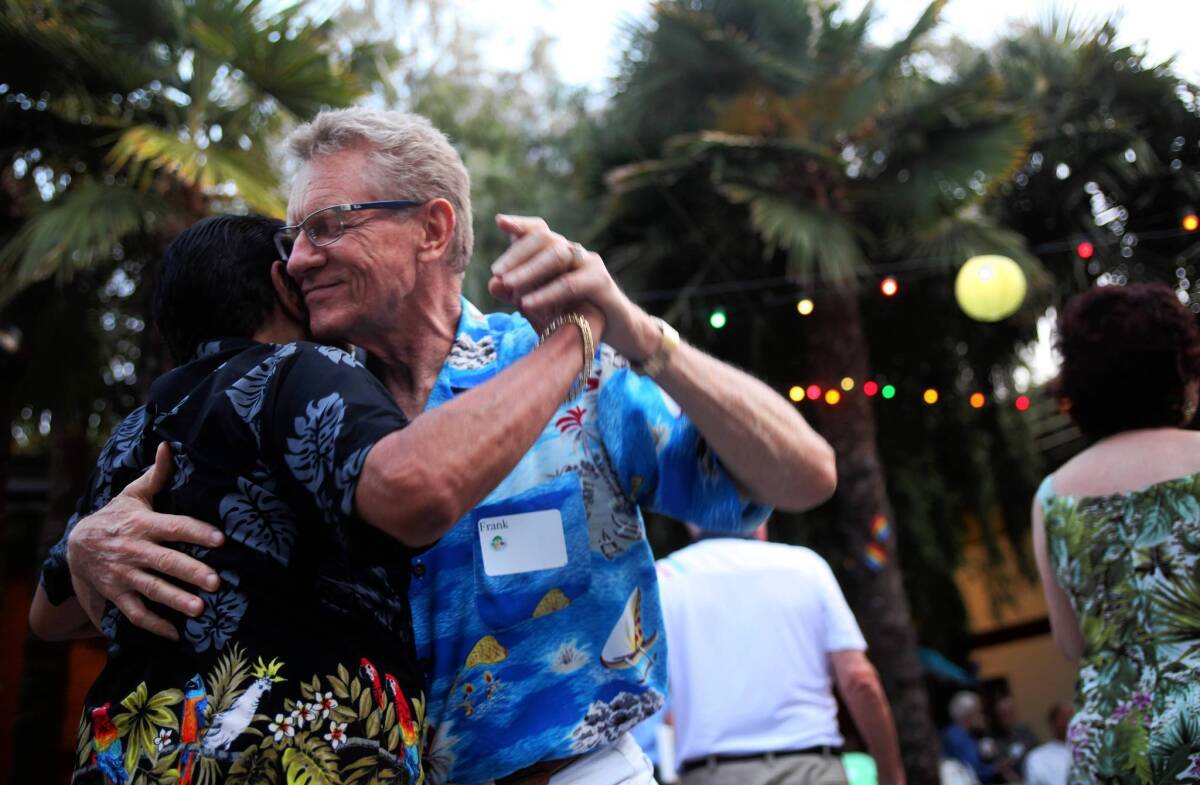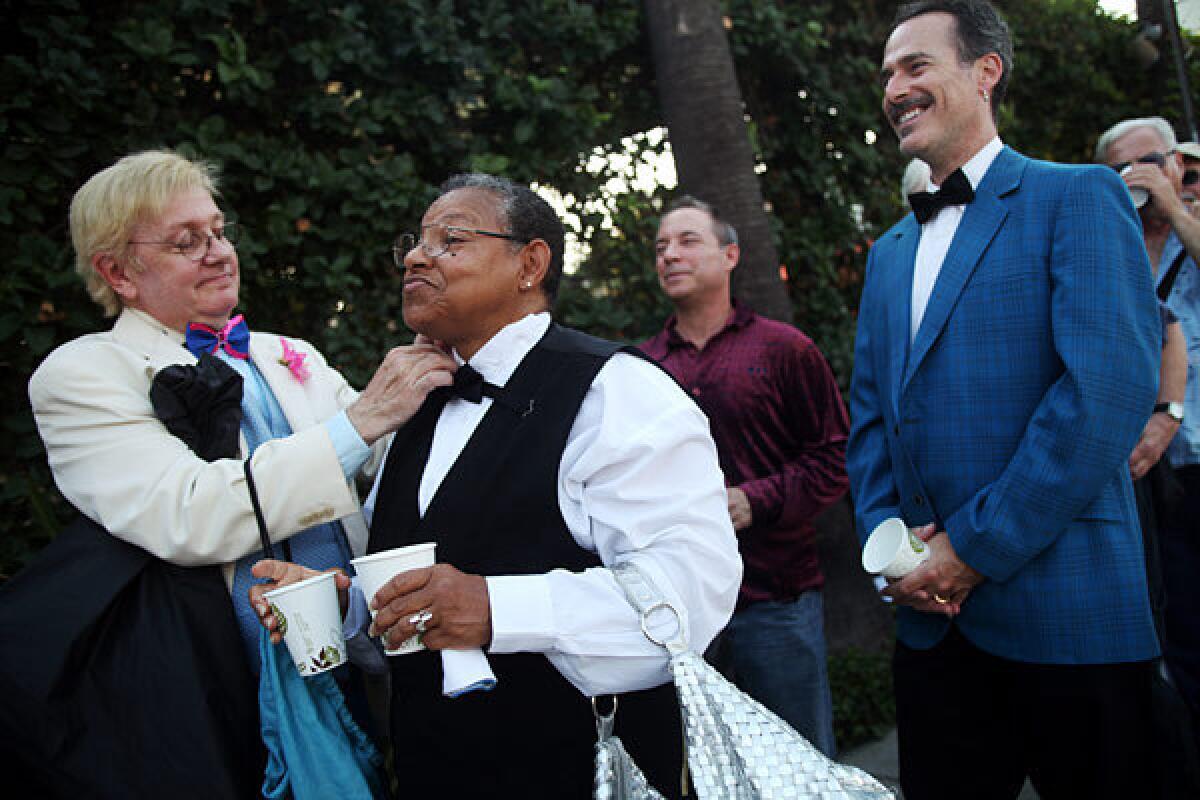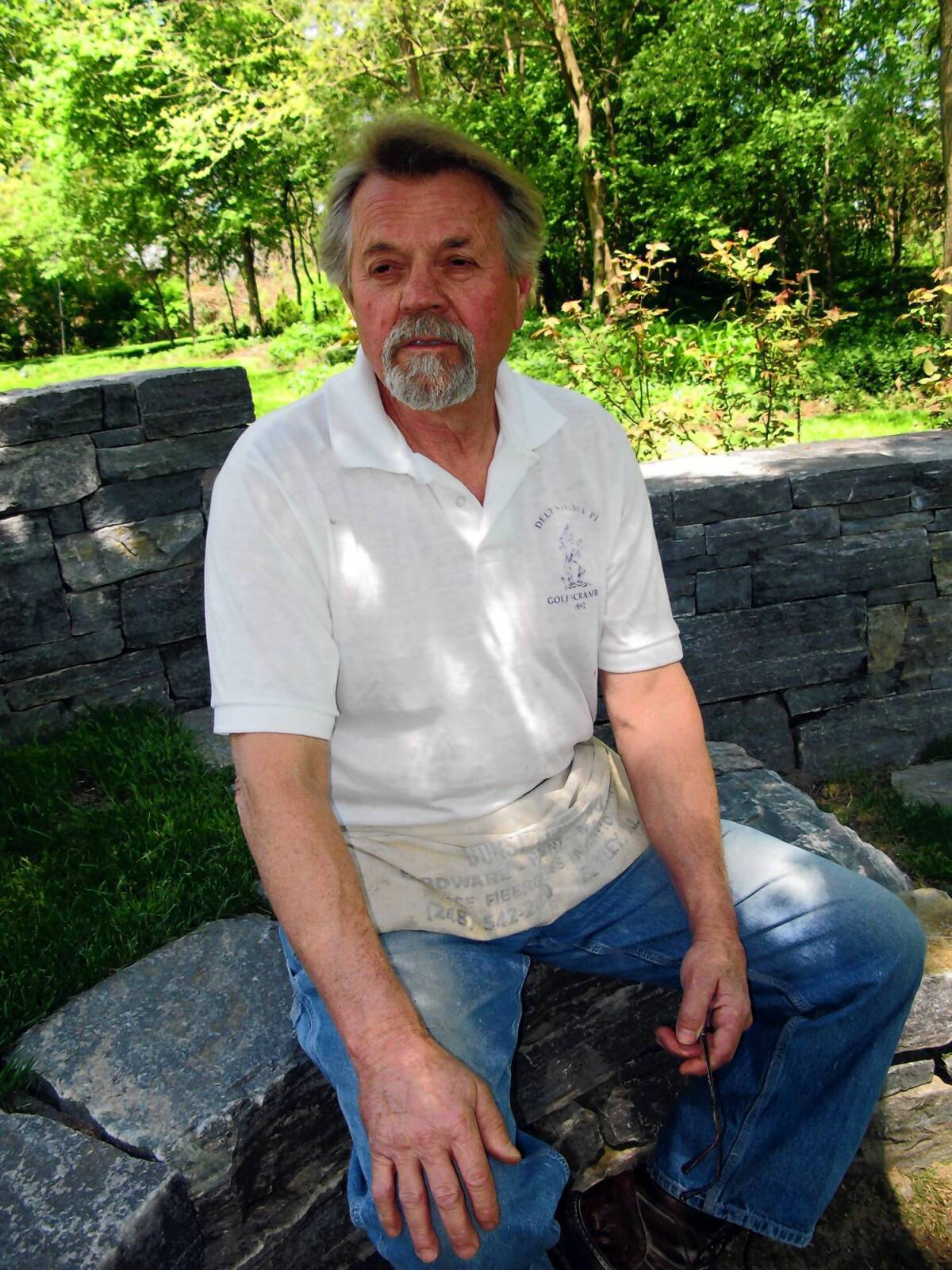Gay and lesbian couples finally get their prom night

For many older same-sex couples, the L.A. Gay and Lesbian Center’s senior citizen prom is the one they couldn’t have when they were younger.
- Share via
For his high school prom in 1942, Robert Clement bought a white orchid corsage in a fancy plastic box.
He gave it to a female staff member who organized the dance. Others would think it was a kind gesture, that he was just a considerate young man. In truth, Clement didn't have anyone else to give it to.
He liked boys. And he couldn't take a boy to the prom. Especially not seven decades ago in a small town in Pennsylvania.
"Proms are a rite of passage," Clement said. "A heterosexual rite of passage.... But it wasn't mine."
Last weekend, just one day after gay marriage became legal once more in California, Clement found himself getting dressed up for the prom again — the L.A. Gay and Lesbian Center's senior prom.
He's 88 now. He has thinning gray hair and wrinkles around his blue eyes. And a party shirt.
An hour before the prom in Hollywood on Saturday, the soft-spoken World War II veteran changed into "a very fancy shirt — my fake Versace." It was blue and silky, with a gold chariot on the back. A bit of a splurge, he admitted.
He looked forward to hugging old friends. Enjoying the music. He might dance a little, though he's "never been quite a keen dancer."
That would have been his partner of 44 years, whose waltzes were breathtaking. In September, John Darcy Noble will have been dead 10 years.
Clement lights up when he talks about Noble. He smiles, sadly and sweetly.
"I would have been with the most popular guy at the dance."

For many, the senior citizen prom was the one they couldn't have when they were younger.
Even now, several of the promgoers were still in the closet and wouldn't give their names. At the dance, they said, they could be free. But not outside.

Brian Frank, left, a volunteer at the L.A. Gay and Lesbian Center, dances with Rosie Del Mar at the center's prom in Hollywood.
The prom started promptly at 5:30 p.m., but by 5, the line of people — some in tuxedos (both men and women), others in jeans — stretched half a block.
The promgoers walked on a red carpet as they entered the patio where a catered meal awaited. The volunteers wore flying uniforms to match the theme, "Come Fly with Me." The Beach Boys — "Wouldn't it be nice to live together / In the kind of world where we belong" — floated out over the loudspeaker.
A Lucille Ball impersonator with a high-pitched voice led the crowd in a conga line to the dance floor — including a woman pushing a walker. One man wore a beaded necklace with the equality symbol and fanned his face with a paper AARP fan.
"Welcome to Freedom Airlines!" an emcee shouted as the partygoers found their seats at tables decorated with rainbow flags.

Clement made his way to a table of men as Frank Sinatra crooned. He hugged old friends, and his party shirt shined under a large sterling-silver cross.
When he was a young man, just out of the Army after World War II ended, police in his small hometown hunted for homosexuals, he said. They took people out of their homes in handcuffs if they even suspected they were gay.
The Beach Boys — 'Wouldn't it be nice to live together / In the kind of world where we belong' — floated out over the loudspeaker.
Clement had his first boyfriend just after the war. He was living with his parents, and his mother took his suit to the cleaners. Inside, she found a love letter.
"Are you involved?" he recalls his mother asking him when police started the raids. "'No,' he said. 'But I could be.'"

Pam Jones-McCoard, 68, was all over the dance floor in a blue corset top, carpenter shorts and a blue grass skirt. She threw her arms in the air and shimmied her legs.
Long ago, Jones-McCoard married a gay man. It was just something gay women and gay men did years ago, she said, before there were domestic partnerships and, of all things, legal gay marriages.
Her husband was at the dance. He'd brought a man as his date. She'd brought a woman.
"Tomorrow's our 28th anniversary," she said, smiling.
Jones-McCoard and her husband had been friends for years before marrying.
They still live together, "in separate bedrooms, of course."

In 1959, Clement was on vacation in London. Late one night, he stared at a bus stop sign on Oxford Street, trying to figure out when the next bus would arrive.
A young man walked up. Clement had missed the last bus for the night and would have to wait a while, John Darcy Noble told him. They began talking.

Frank Shoufer, right, dances with Robert Meza at the L.A. Gay and Lesbian Center's prom in Hollywood. Promgoers walked on a red carpet as part of the event, whose theme was "Come Fly With Me." (Julia Wall / Los Angeles Times)
In the four decades of their relationship, they would always disagree about whether it was raining that night or just drizzling.
"He was fantastic," Clement said. "He had that thing that I was almost jealous of. People were enchanted by him. You were the total focus of his attention, every person he met."
After Clement came back to the United States, he and Noble wrote to each other. He was a priest at a Polish National Catholic Church parish in New Jersey, but he was in the closet. When Noble came for a visit, Clement knew he had to make a decision: stay in the parish or be with Noble.
Clement told the bishop he wanted to leave the parish but did not tell him why. He and Noble moved together to New York City. In 1970, Clement founded the Church of the Beloved Disciple — an independent church — which reached out to gay people.
He and Noble marched in New York's first gay pride parade that year, Clement in full priest regalia and collar, clutching a banner: "Gay people, this is your church."
There, he performed "holy unions" for gay couples. Officials in the city clerk's office told him to stop performing mock marriages, he said. He told them there was separation between church and state and that "what I do in my church is none of your business," he recalled. They stopped asking.
In 1971, Clement and Noble had their own holy union.
Clement didn't think he'd see legal gay marriage in his lifetime.

Shirley Horowitz, 90, and Marie McPherson, 91, were some of the last to make their way from the dining area to the checkered outdoor dance floor. Each table was decorated with signs noting a travel location. Theirs was New York.
The couple met at a dinner party in New York in 1947 and have been together 66 years. McPherson was always a great dancer. Horowitz, not so much, McPherson said, teasing her. But McPherson, who walks slowly with a walker, wouldn't be dancing this night.
On a stage in front of the dance floor, a woman welcomed the crowd. "We know we have stood on your shoulders," she said. "We know we wouldn't be here if you hadn't lived your lives authentically and honestly."
They all cheered at mentions of the U.S. Supreme Court's decisions on the Defense of Marriage Act and Proposition 8, California's ban on same-sex marriage.
Arro Verse, a Los Angeles musician, sang a song she had written.
Never thought of the words
"Marry Me"
Gotta fight for the words
"Marry me"
My heart pumps for the words
The crowd joined in: "Marry me."
As she sang, Horowitz and McPherson settled into plastic chairs. They shared a piece of white cake.

After Clement had been doing his church work and civil unions, he knew he'd have to go back home to Pennsylvania and officially come out to his family and tell them about his activism in the early 1970s. After the police raids, his mother had suspected he was gay, but he had never actually admitted it to her, he said.
It was like living in old times with old friends. The whole place just came together."— Robert Clement, 88
His mother took one look at his longer hair and screamed at him, telling him to go get a haircut and that the town didn't welcome hippies — before he could even say he was gay. After he did tell her, it took about two years for her to "relax into accepting" his homosexuality, he said.
In the 1980s, Clement and Noble retired to California. They lived a slower life as a "happy gay couple," Clement said. Noble died in 2003 of complications from diabetes.

Clement and a friend, Michael Korhonen, sat with a few others at a table behind the dance floor. Hours before, Korhonen, a 65-year-old set designer, had been busy in his Mid-Wilshire home finishing the intricate beading on necklaces for himself and a friend. Now, they were wearing them. A silver-haired woman at their table wore a glow stick in her hair.
Clement clapped his hands and laughed as the prom king and queen were crowned. The queen was 79, the king 86. They each chose a dance partner of the same sex.
It was after 9, and Clement had tried to leave several times but kept getting pulled back by friends who wanted to talk.
"It was like living in old times with old friends," he said of the party. "The whole place just came together."
Just after 9:30, he walked out, car keys and a small rainbow flag in hand and a smile on his face.
Sign up for Essential California
The most important California stories and recommendations in your inbox every morning.
You may occasionally receive promotional content from the Los Angeles Times.










